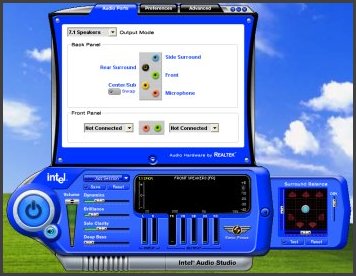High Definition Audio
High Definition Audio is Intel's replacement for the ageing AC'97 standard that's served the industry well since its inception, but which is now looking more than a little long in the tooth.Paired with external CODECs, the AC'97 standard provides audio in a PC system at a fixed specification, any AC'97-implementing southbridge or external audio processor supplying the CODEC with a fixed data set within certain technical boundaries.
High Definition Audio is no different, with a supporting southbridge host supplying an external CODEC with the data it needs to present audio to the listener, or to capture it from an input source via the CODEC, before passing it to the HDA host.
With the basics being the same, it's the specification that holds the details. HDA improves upon AC'97 in a number of ways, most notably in its extra bandwidth for audio inputs and outputs, and in the dynamic range of audio that it can accept and produce.
Without going into mounds of detail, HDA supports 32-bit, 192kHz audio input and output on multiple sources synchronously, with bandwidth for each input or output source allocated dynamically according to the presented audio format. The available bandwidth, up to 48MB/sec for each audio output and 24MB/sec per input, can be aggregated across the bus that the HDA host sits on, using only what's needed, saving bandwidth when the data has to travel to and from the CPU for any extra processing.
In comparison, AC'97 has fixed bandwidth requirements, and limited support for high dynamic range audio, depending on the CODEC. Late-generation AC'97 audio has support for 8 channel output and digital input and output, but the dynamic range has fallen well short of what HDA provides.
Best of all, it's an open audio standard, so non-Intel platforms should adopt it in short order.
For their own desktop boards, Intel have chosen the Realtek ALC880 CODEC, one of two Realtek HDA parts, the other being the 2-channel ALC260.
Realtek ALC880
As an example of a HDA CODEC, the Realtek ALC880 provides:DACs with 100dB signal-to-noise ratio
ADCs with >85db SNR
8 digital audio channels supporting 24-bit PCM
44.1k/48k/96k/192kHz DAC sample rates
4-channel/192kHz and 6-channel/96kHz DVD-Audio support
16/20/24-bit S/PDIF input and output with 44.1k/48k/96kHz sample rates
Supports EAX 1.0 and 2.0, DirectSound 3D, A3D, I3DL2, Sensaura and HRTF 3D audio formats
Optional AC-3 support
As far as audio CODECs go, the ALC880 appears to be a fine initial choice for HDA-equipped motherboards, expect to see it on a variety of Alderwood and Grantsdale motherboards.
Audio Studio
Paired with the ALC880 on their desktop boards, Intel provide some simple software for configuration of the part.It's basic software with some noticable GUI lag, but it lets you configure the CODEC with ease. Audio Studio is installed separately to the ALC880 driver. Other vendors using the ALC880 will supply their own configuration interface for the CODEC.










